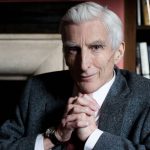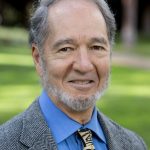Sustainable Development Goal 12 calls for responsible production and consumption. As co-host Claudia Romo Edelman points out in this episode, that does not sound as dramatic as ending poverty or educating everyone, but it may be just as important. There is a disparity of consumption between the Global North and South. SDG 12 is the only goal that specifically calls on rich nations to lead.
In our interview with Jared Diamond, he says that one American consumes as much as 32 Kenyans. Diamond, UCLA professor and author of the new book, Upheaval: Turning Points for Nation’s in Crisis, says this inequality is unsustainable as citizens of poorer countries demand better lives. The only sustainable world, he says, is a more equal world.
Our most dangerous overconsumption is energy from fossil fuels. Co-host Edie Lush reports on a Financial Times chart which shows only a small percentage of the worlds largest corporations on track to reduce their carbon emissions enough to meet the goals of the Paris Climate accord.
Fuel consumption continues to increase and therefore carbon emissions increase. According to the oil major, BP, renewables and natural gas are the fastest growing energy sources , yet in 2018 carbon emissions grew at their highest rate for 7 years at 2.0%.
“We use more resources and we are having a heavy footprint which is affecting the biosphere and affecting the climate” says Author and Royal Astronomer Sir Martin Rees, author of On The Future and other books. We need to invest now to protect our children and grandchildren from climate risk, Lord Martin explains, and spending decisions can’t be judged with the same financial tools, such as the discount rate, used to measure the value of traditional investments.
Once again we describe the interconnections of the SDGs. Achieving goal 12, Claudia explains, is connected to achieving goal 13, action to control climate change and The Ceo of our partner, APolitical, Robyn Scott, points out that educating women and girls is on the list of important actions to curb climate change. She offers Facts and Actions.
Claudia and Edie give a shout out to a listener from Pittsburgh, Jason Hallmark. He is on a journey of a lifetime to learn about sustainability in the Arctic and we are very proud to have helped inspire him in a new chapter of his life.
Two executives from our sponsor, MasterCard, describe financial tools that can improve lives.
Featured guests




Jared Diamond is a professor of geography at the University of California, Los Angeles. He is the author, most recently, of Upheaval: Turning Points for Nations in Crisis, as well as The World Until Yesterday: What Can We Learn from Traditional Societies?; Collapse: How Societies Choose to Fail or Succeed, and the Pulitzer Prize-winning author of the widely acclaimed Guns, Germs, and Steel: The Fates of Human Societies, which is also the winner of Britain’s 1998 Rhone-Poulenc Science Book Prize. Dr. Diamond is the recipient of a MacArthur Foundation Fellowship (“Genius Award”); research prizes of the American Physiological Society, National Geographic Society, and Zoological Society of San Diego; and many teaching awards and endowed public lectureships. In addition, he has been elected a member of all three of the leading national scientific/academic honorary societies (National Academy of Sciences, American Academy of Arts and Sciences, American Philosophical Society).


Transcript
Audio Music: 00:02
Sir Martin Rees: 00:03 the world has existed for 45 million centuries, but this is really the first century when one species, the human species can determine the planets fate we use more resources and we are having a heavy footprint which is affecting the biosphere and affecting the climate.
Jared Diamond: 00:23 Consumption rates, meaning consumption rates of water, fuel and other resources. Metals in the developed world on the average about 32 times those in the poorest countries, and that means that one American citizen has the impact of the world of 32 Kenyans. It’s becoming increasingly impossible to have a stable world with big differences in standards of livings around the world. The only stable outcome is going to be a world with much more equal standards of living around it.
Audio Music: 01:02 [inaudible]
Edie Lush: 01:02 welcome to the global goals cast,
Claudia R E: 01:04 the podcast that explores how to change the world.
Edie Lush: 01:07 That world of ours, particularly the rich world, is consuming more than our planet can sustain
Claudia R E: 01:12 Edie our listeners already know as well as we do that we are burning eating and tossing away so much that both the air and the seas will be ruined if we do not make changes. They also know that while there is some action going on, we are not moving fast enough.
Edie Lush: 01:31 Yes, so what we’re going to show you today are two different ways we can approach the problem from two pretty stellar thinkers, Jared Diamond and Martin Rees. Plus we’re going to share with you a sustainable energy solution that already serves a million people in Africa and is scalable right now to billions of people all around the world. But first, this message from the sponsors who make this a sustainable podcasts.
Speaker 3: 02:00 This episode is sponsored by mastercard and our thanks to CBS News, digital and to Harmon, the official sound of global goals cast.
Edie Lush: 02:16 Welcome back. I’m Edie Lush
Claudia R E: 02:18 and I am Claudia Romo Edelman. Very lucky to be sharing the same actually physical place to do this recording. I know
Edie Lush: 02:26 surprise special here we are in Cannes at the Cannes lions festival.
Claudia R E: 02:30 At six o’clock in the morning.
Edie Lush: 02:32 Yeah.
Claudia R E: 02:32 Actually in a very little room that is not sound protected like our studios, full of pictures saying we’re strong like superman and [inaudible]. But what a treat to be here with you
Edie Lush: 02:45 it is great.
Claudia R E: 02:48 So we’re going to have a great episode today because we’re going to be talking about how the end of the century may feel like a long way off, but actually it is within the lifetime of people alive today. Our kids, Edie will be in their nineties by the turn of the century. Oh, it’s crazy to imagine that our kids will be that old
Edie Lush: 03:07 I know, with wrinkles. [laughing] So one of the questions we will ask is how can we learn to think long term or at least longer term to protect the world of the day after tomorrow, the one our children and grandchildren will live in. And I think Claudia, that you will be a cool granny.
Claudia R E: 03:27 Like totally. You can picture it, right? Like the bikinis the motorcycle, the boots. The question really Edie is what kind of a world will we be living? The motivation behind this episode is sustainable development. Goal number 12 responsible production and consumption. We hardly hear about this goal. and it might not sound very dramatic like ending poverty or educating everyone, but actually it is as dramatic and like every other goal. It is connected to so many other goals. Climate Change, sustainable cities life in the sea. We want to understand the problem and we want to take a stab and how to address it.
Edie Lush: 04:09 So I sought out Jared diamond. He’s a professor at my Alma Mater, UCLA go Bruins and a Pulitzer Prize winning author of books on why civilizations succeed and fail. His new book upheaval looks at our modern world. I kicked off by asking him about the world’s population growth.
Jared Diamond: 04:31 World’s human population is a subject that was at the forefront 30 40 years ago when many people said it’s the biggest problem for the world. Since then, we’ve learned, no, it’s not the biggest problem for the world. What counts is not the raw number of people. What counts is the total consumption rate because there’s enormous variation between people’s consumption rates in different parts of the world. Consumption rates, meaning consumption rates of water, fuel and other resources, metals in the developed world on the average about 32 times those in the poorest countries, and that means that one American citizen has the impact of the world up 32 Kenyans. I mentioned specifically Kenyon’s because there are many Americans who feel indignant and concerned about the growing population of Africa and yes, it’s a tragedy for Africa, but as far as the impact on the world is concerned, 50 million Kenyans or equivalent to 1.7 million Americans Kenya is trivial for its impact on the world. That’s why I say that what counts is consumption rates rather than population itself. climate change is often equated…
Edie Lush: 05:52 Climate change is arguably the worst effect of over consumption. We’re burning way more fuel than the atmosphere can hold safely. but there are those who say technology will save us from having to cut consumption by engineering the damage back out of the atmosphere. Diamond disagrees.
Jared Diamond: 06:10 There were proposed geoengineering solutions of, of scattering iron particles in the ocean or shooting things into the atmosphere and calculations are made that they want to produce such and such on effect. And behold they do have that effect in the laboratory. The problem is that how a manipulation works in the laboratory is not necessarily a good predictor of how it Will work up in the atmosphere and the prime example of that is chlorofluorocarbons gases in the laboratory, CFCs absolutely benign. It turned out something unpredictable. The CFCs released into the atmosphere destroy the ozone layer, which protects us against ultraviolet light and it’s a really serious effect. It took about 20 years to establish it. The chemical industry kicked and screamed and saying said, no, CFCs are innocent and turned out they were not as innocent, but it took 20 years to convince people. And I will give you one more example because today it seems so ridiculous. One of my teachers at university, he was sufficiently old, but he was alive in the first decade in the 19 hundreds when automobiles were replacing horses on the streets of New York and Boston. And as automobiles began to replace horses, people were thrilled because horses deposit Manure and the Clickety clack of the hooves on the street is noisy until what automobiles came in. People said thank God with automobiles our cities are now going to be clean and quiet. Haha. Unexpected side effects of automobiles
Edie Lush: 07:46 let me read you a quotation from your book. So does this mean that climate change is unstoppable? No, of course not. Climate change is being caused overwhelmingly by human activities. So all we have to do in order to reduce climate change is to reduce those human activities. That means burning less fossil fuel, getting more energy from renewable sources such as wind, solar and nuclear. So it sounds easy, right?
Jared Diamond: 08:15 The principle is easy. The only difficulty is in persuading people to do it. That’s to say persuading people to burn less fossil fuel. And that requires two things, less energy consumption overall and more of that energy coming from non fossil fuel sources so it really is very simple. And there are people who are inclined to do it now. We have to get more people inclined to do it. Government action can help by making it illegal to do various things. For example, my understanding is that big cars like Humvees with low gas mileage like six miles per gallon in the United, you may incur lower automobile taxes. They can be classified as farm vehicles or other things, which means that that it’s cheaper to buy a Humvee than to buy a Prius. Whereas in Europe, big vehicles are tax equal to the cost of the car itself. That’s to say if you choose to buy a Humvee, that’s your privilege, but you will pay double the market price of the Humvee to drive a Humvee. That is a way to discourage people from buying gas coddling vehicles in. In short, a combination of government action at personal decisions can reduce burning of fossil fuels.
Edie Lush: 09:35 So the other issue is of course the apparently low cost of fossil fuels. So how do we include those indirect costs of a liter of fossil fuels or a gallon of gasoline?
Jared Diamond: 09:49 A simple way would be to include in the price of fossil fuels, the damage costs of the fossil fuels incur. If, for example, a farmer chooses to spread oil over his fields for some reason and the oil leaks to a neighbor’s fields and the neighbor sues the first farmer, the neighbor will win the lawsuit and will make the first farmer pay for the damage done to the fields of the second farmer. Fossil fuels are doing that. They’re producing cost for the entire world, but when you buy your gasoline in California for $4 and 23 cents a gallon in Los Angeles, now, yes, the gas cost $4 and 23 cents a gallon, but it causes $35 per gallon of damage to the whole world and that $35 or to be included, if you want to drive a car and burn gas and have your Humvee, by all means do so what you should have to pay the $35 for the damage that you causing.
Edie Lush: 10:47 What do you say about the indirect costs of renewables? So people who don’t like solar farms because of the impact that has on the desert tortoise, for example, in California or birds killed by windmills. What about the indirect costs there?
Speaker 2: 11:03 Yes, renewables do have indirect costs which need to be taken into account. The solar fields in the deserts of California. They do remove habitat for desert tortoises, therefore would be appropriate for solar farms. Also to set aside $250,000 per square mile solar farm in order to mitigate the damage to the um, desert tortoises. And as for windmills, yes windmills do kill Migrant Birds and bats. Last estimate I saw was that windmills kill someone like 45,000 birds per year in the United States. Well an outdoor cat, it turns out, kills 300 birds per year. And therefore the windmills in the United States, are the equivalent of 135 cats. Therefore, to mitigate windmills, you can mitigate windmills if you eliminated 135 cats. Yes, we should do that. But that’s pretty cheap. Fossil fuels, I would rather eliminate 135 cats
Edie Lush: 12:01 or maybe put a lot of bells around them.
Edie Lush: 12:06 So we’re in Europe here and there is a strange dichotomy between Europe and the United States. Americans have a higher rate of energy consumption, which is twice Europe’s, and that’s despite Europeans enjoying a higher standard of living than American.
Jared Diamond: 12:23 It is true that Americans have roughly double the rate of fuel consumption of Europeans. Part of the reason of course is that the distances in the United States are larger and your jet plane burns more fuel if you fly from Boston to Los Angeles, then if you fly from London to Manchester, that’s part of the reason. The other reason is that Americans are very wasteful of energy. I’m particularly with respect to our automobiles and we do not make Americans pay for the privilege of driving their Humvees and the other gas guzzling automobiles.
Edie Lush: 12:59 Until recently, the existence of poor people elsewhere in the world didn’t constitute a threat to the overindulgent over consumptive lifestyles of those who lived in the United States. But that has changed.
Speaker 2: 13:15 Those poor people out there in the past 60 years ago didn’t pose a threat to Americans because number one, they didn’t have television and cell phones and they didn’t know about the wonderful, luxurious lifestyle in the United States firsthand. And secondly, with the methods of travel, the first time I came to Europe in 1950 I came by ship nowadays we would never dream of coming by ship to Europe and you fly, fly by airplane, people move much more easily around the world. And that means among other things that they can immigrate and immigrate much more easily. So there’s much more immigration pressure. It’s understandable that people from the developing world war to move because they have a much less satisfactory lifestyle and they know that their government is not going to solve their lifestyle within the lifetime or within the lifetime and the children. So of course they want to migrate, but migrating also means increasing the impact of the world. Or what it means is that the, a stable world requires a more equal world. It’s becoming increasingly impossible to have a stable world with big differences in standards of livings around the world, and the only stable outcome is going to be a world with much more equal standards of living around it.
Jared Diamond: 14:35 The world does have a track record of solving really thorny problems and some of those problems include delineating overlapping economic zones along the coast in shallow water. Wherever you get two countries that are adjacent to each other with seacoast they are likely to have overlapping coastal economic zones and it is really thorny to decide how to delineate the economic zones of adjacent countries. Nevertheless, negotiations were carried out all around the world with a result that there is agreement on economic zones between every neighboring country that has a seacoast. That was a really difficult problem, but the negotiation succeeded. Another negotiation that succeeded was establishing a framework, for mining minerals from the sea bed on the floor of the sea or the mineral nodules, which essentially are pure minerals. The technology was available for mining the mineral nodules on the ocean bottom decades ago, but there wasn’t a legal framework, meaning that if you sent out one country sent out a ship to suck up minerals here, another country could send out a ship 200 feet away and suck up those same minerals. Therefore, there was not, nobody wanted to invest in the economics of harvesting minerals from the ocean floor, but now in the last few decades, there is a legal framework. It was again, thorny to negotiate. One of the things that made it difficult to negotiate is that all of those landlocked countries like Zambia and Mongolia and Bolivia and lows were screaming, this does us no good. Those countries that have sea coast they’re the ones that can suck up the minerals and there’s no way we can suck them up. So of course we’re not going to agree to a plan that allows those countries where the seacoast and suck up the minerals. There were negotiations and the results of the negotiations, which took a decade or a couple of decades, is that the landlocked, countries like Bolivia in Zambia, they get 15% of the royalties that are produced by the coastal country. It was difficult negotiation. Those are examples of the world resolving by negotiation, difficult problems of competition between nations. Since we solve those difficult problems, that gives some grounds for optimism that we could also solve climate change and non sustainable resource use. One can object, well climate change is more difficult than those problems that we’ve solved this is more difficult than the mineral noduels on the ocean floor and yes, it’s probably true that climate change is more difficult with the fact is that there is a framework and the framework has succeeded in many difficult cases.
Edie Lush: 17:17 We also live in a world in which corporations, companies, some of them have much larger GDPs if they were to be a country Zambia you mentioned it is in terms of its GDP is actually much lower than a lot of the companies listed on the S&P 500 or the ftse 100 so what role do you see that corporations that business can play in this world?
Jared Diamond: 17:41 20 years ago I would’ve answered the role that business plays in the world is evil because Zambia is not only smaller Coca Cola and Chevron, but Zambia doesn’t do evil to the rest of the world. Where as Coca Cola and Chevron and Walmart do do evil to the rest of the world. They do no good and they are environmentally damaging and they’re among the worst effects on the environment today. That was what I would have said 20 years ago and there was some justice to it. What has changed since then is first Jared has learned on, I’m on the board board of directors of World Wildlife Fund US and I’ve been on the board of directors of the Conservation International. On the boards of these big environmental organizations are CEOs and leaders of Coca Cola. The head of the board of trustees of world wildlife on US was the CEO of Coca Cola and on the Board of Conservation International is Rob Walton, son of Sam Walton, head of Walmart and Unilever has also been a big player with World Wildlife Fund. I’ve discovered a couple of things, one that they found it in their interest to be environmentally clean. That’s not to say that big corporations are environmentally clean across the board. Yes, still doing the really, some really bad things, but also some big corporations are among the most powerful forces for environmental good in the world today and that’s something that lots of radical environmentalists don’t want to hear about. I can discuss anything with my wife but not Walmart, [laugh]
Edie Lush: 19:23 So it seems that globalization, which is sort of how you ended that book is both a blessing and a curse and I wonder how you come down on it when you think, how is this going to play out? Maybe not for you and me, but for our descendants.
Jared Diamond: 19:39 I’m laughing because when you said globalization is both a blessing and a curse that applies so many things. Marriage is a blessing and a curse. Children are a blessing and a curse. How can we maximize the benefits of globalization while minimizing the damage? Globalization means that ideas and technologies do spread rapidly around the world. That includes good constructive technologies as well as bad technology spreading around the world. Globalization means that that countries today no longer have the option of collapsing one by one. Quite a few of the most powerful societies of the past collapsed due to environmental damage. They were auto sufficient. They depended largely on their own resources and so when the classic Maya civilization of the yucatan, the most advanced civilization in the new world before Columbus collapsed, nobody knew about in Europe and probably nobody knew about or in the valley of Mexico either. Today, societies can collapse one by one because they are supported by other societies. That’s an advantage. That of globalization. Drawbacks of globalization of ones we’ve talked about, namely the spread of diseases around the world and the unstoppable movements of of people. The challenge for us is to reduce the bad effects of globalization and to increase the good effects. Just as the challenge for any couple is to, increase the benefits of a marriage and to produce the disadvantages.
Edie Lush: 21:09 Thank you very much, professor Diamond. I really appreciate your time.
Jared Diamond: 21:13 You are welcome.
Edie Lush: 21:16 It was fascinating hearing Jared Diamond describing his conversion from thinking corporations were a lot of the problem to believing corporations are part of the solution. Just after I talked to him, the Financial Times came out with an interesting chart that showed that only 15% of the 500 biggest businesses in the world, on course to reduce their carbon consumption and enough to be in line with the Paris accords.
Claudia R E: 21:41 So a lot of work still to be done and one place we always draw inspiration from is you, you our dear listeners. Edie, did you hear about our listener in Pittsburgh, Jason Hallmark?
Edie Lush: 21:53 I did. What a courageous man.
Claudia R E: 21:55 Oh my God.
Edie Lush: 21:56 He was inspired by our episodes last season in which Robert Swan and his son made a challenging track to the South Pole, relying only on sustainable energy, but hallmark had a challenge of his own. He was diagnosed last year with multiple sclerosis,
Claudia R E: 22:10 but he didn’t let that stop him. Three days after the diagnosis, he applied to a program he heard about here at the global goals cast. It’s called leadership on the edge and he spending 10 days in June this year in the program to witness climate change in the Arctic and bringing the lessons home to Pittsburgh.
Edie Lush: 22:31 I have chills, Jason, we hope you’re having a great trip. Drop us a line. We’re very proud of you for taking action
Claudia R E: 22:38 and in a moment we will hear from another big thinker about the future. Lord Martin Rees hit up the center of for existential risks, astronomer royal of the United Kingdom and from an entrepreneur who has the signed solar powered electric grids so that Africa can grow without adding to the carbon problem
Edie Lush: 22:59 but first. Another great executive from our sponsor, MasterCard
Shamina Singh: 23:05 with the girls for Tech Program that actually mastercard launched in 2014 again, we’re going to create a new set of actors in the technology space that heretofore just haven’t been there unless we make sure that women and girls have access to the learning, to the tools, to the education that’s required to not only succeed in this new economy that actually shape the new economy, we won’t realize the potential of what’s possible. So girls for tech is about creating future problem solvers. That’s how we see girls in the future and right now. So we have to make sure that the stem principles are shared equally and we have a goal actually to reach 200,000 girls by 2020 we’re halfway there in 25 countries because we’re a global company with network all over the world. We’re in 210 markets. When you’re a company like mastercard who has for each, everywhere ubiquitous, you have an opportunity to reach everyone everywhere.
Edie Lush: 24:09 That’s Shamina Singh from mastercard. Later on we’ll hear from Tara Nathan on how mastercard used it’s fin tech skills to deliver humanitarian aid.
Claudia R E: 24:19 But now we go from Ucla to Cambridge. We do not always spend so much so much time the ivory tower Edie.
Edie Lush: 24:26 I know, I couldn’t. I couldn’t resist an interview with Martin Rees because I have wanted to interview him for ages. My only regret is that I couldn’t find a way to get into his views on black holes or whether we should send people into space or leave it to robots.
Sir Martin Rees: 24:43 The theme of my book on the future is that the world has existed for 45 million centuries, but this is really the first century when one species, the human species can determine the planet’s fate. And this is the two reasons. One is that, uh, there are more others were more empowered by technology. We use more resources and we are having a heavy footprint, which is affecting the biosphere and affecting the climate.
Edie Lush: 25:13 Sir Martin talks about being deep in the anthropocene. The moment we’re in right now, when one species, the human race is so empowered and dominant that it has the planet’s future in his hands. I asked him if that means we’re creating measurable physical changes to Earth that are on a geological timescale,
Sir Martin Rees: 25:33 well a short-term geological time scale really. And uh, one of the pointers of the biosphere and the climate have been changed going very slow timescales, whereas they’re now changing on a human timescale. Of the lesson the century, which is a close, very, very much faster. And that’s why species can’t adapt to climate change and a leading to mass extinctions. And sadly we are risking destroying the book of life before we’ve read it. If we have mass extinctions,
Claudia R E: 26:01 Jared Diamond’s spoke about internalizing the externality or making the cost of a car include its impact on the environment. Martin Reese spoke about taking another concept, the discount rate commonly used in finance to determine What is worth spending now to achieve some value in the future? And what happens when you apply that approach to our impact on the environment?
Sir Martin Rees: 26:26 Well, everyone values immediate benefits rather than deferred benefits. And of course this is a standard discount rate that’s used in all economic decision making. How much more you value having something now compared to one year or 10 years or 50 years in the future. And of course, uh, this discount rate which is used by banks and everyone else is determined by a concatenation of economic factors. But the point I would like to emphasize is that the discount rate, which is appropriate in making many economic decisions is not the one which is appropriate when we are thinking about the future of generations as yet unborn. And uh, when we think about them, we’ve got to not value less. What happens at the end of ascension and now we’ve got to prepare to spend money now in order to alleviate any burdens that people at the end of ascension will have. And I think the psychological reason for this is that we do care about the life chances of babies born today who’ll be alive in the 22nd century. And if it would be shameful if the legacy that we left for future generations was a depleted and more dangerous world.
Claudia R E: 27:39 Part of the problem is that making decisions for those who will live in 2100 requires making real sacrifices today. I mean spending sacrifices, lowering investment rates, lower in consumption, a lower discount rate. But we have done it before.
Edie Lush: 27:57 I asked Sir Martin if it’s fair to say that climate change isn’t a scientific challenge anymore because we actually know the science,
Sir Martin Rees: 28:05 we know enough science to know there’s a substantial risk of something really bad by the end of the century. And that’s why we need to take precautions to remove that risk. The most important thing we could do to, uh, reduce the risk of long term climate change would be to accelerate research and development into all forms of clean energy. The first of the research is done, the quicker advances we’ve made and the cost will come down. And if you think of India, where they are now depend on energy from smokey stoves, burning wood and Dung, they need more energy. They need a grid of some kind. And if we can accelerate the development of clean energy so cheap, then they will leapfrog directly to clean energy and not build coal fire power stations. Its what they do otherwise. So to accelerate clean energy development is I think an important global goal and the deed would be hard to think of a more inspirational challenge for young scientists and engineers than to develop clean energy quickly for the whole world.
Edie Lush: 29:12 There obviously needs to be commitment from governments and more regulation and more encouragement for business to invest in these areas as well as for universities to invest in research. But how do you make that happen?
Sir Martin Rees: 29:30 Well obviously the governments can provide the right incentives and a carbon tax, particularly a fiscally neutral carbon tax where the money raised in the tax is used to lower other taxes. That’s a very attractive idea. But the important requirement is to make the public care so the politicians feel they can take these long term decisions and prioritize the longterm without losing votes. And that’s the important thing which we are lacking. So we need more charismatic individuals who can actually persuade the public that we need to do this and it’d be good in the long run. I think when we look back through history, we know that most major changes were initiated by a few key figures and then became mass movements and then the politicians took them up and took action. That’s true of slavery. It’s true of a civil rights that’s true of gay rights and we hope that will become true of the environment. But as apart from that, I think we do have to incentivize the kind of behavior which is helpful environmentally by, uh, appropriate taxes and regulations.
Edie Lush: 30:50 So it’s always part of each episode to present someone who’s out there trying to solve the problems we described. Today that person is Xavier Helgeson an entrepreneur who is doing one of the things Martin Rees called for accelerating clean energy in poor countries.
Xavier Helgesen: 31:08 the average African only uses one or 2% of the power of the average American. And the thinking was that if people could get started with clean energy and use that as their primary source of power and that adding more clean energy was the cheapest and most reliable way to get more power than people would keep using it in the uh, electrical system would grow up in a distributed manner. People know what electricity is, people know electricities everywhere. The question for them is how do I get it in my house and can I afford it? And if I get a solar power system, will it work? And will it keep working? People focus on the solar panel, but really the essence of an off grid solar power system is the smart battery and the battery needs to last for years. So the reason people typically choose our systems is because either they have no electric grid connection or that electric grid connection is unreliable or, or unstable self sufficiency is very, very important to people in these environments because you never know what tomorrow will bring.
Edie Lush: 32:15 I asked Xavier how it works and why it’s affordable.
Xavier Helgesen: 32:19 We designed the capacity based on your needs in a particular segment. So one common example might be a solar power system where you could power your lights and a TV and a fan, but couldn’t power an air conditioner or a fridge to an American that might be unacceptable. But to a middle class African or Indian household, that could be exactly what they need to solve their electrical problem. And designing for the specific use allows you to hit cost targets that allow you to be as affordable as $10 a month. So one other aspect we focus on is integrating the financing into the hardware. So it works like a prepaid mobile phone where people pay in small increments and when they make a payment via their mobile phone, the solar power system in their home unlocks and produces power. And this allows us to extend financing at lower rates even to rural African customers who don’t have traditional credit
Xavier Helgesen: 33:21 Well, we don’t always realize when we have discussions about consumption or over consumption, we don’t always talk about over consumption of what and is that resource finite or, or not finite. So electricity is not really finite. We can produce many, many multiples of what we consume, even if we were all a huge energy gluttons because there’s lots of ways to produce power. And the good news today is that a solar panel on a rooftop is the cheapest source of electricity for the vast majority of people in the world. So the trick then becomes an integration problem. How do we integrate that solar electricity, which happens at random times during the day when the sun shines to serve a billion people with reliable power and allow people to build networks of self generated power. And this becomes very, very powerful because then communities of any scale, whether it’s just myself and my neighbor, whether it’s my town, they can electrify in a way that’s entirely under their control. Most people aspire to own a home rather than rent, but almost everyone in the world rents their electricity. Now I can imagine quite a few people would prefer to own that either themselves or cooperatively with other members of their community.
Claudia R E: 34:46 Edie 1 image sticks to my mind of like from all of the episodes, everything that we heard. The problem is not population growth. It is how much we consume. I mean, if we all consume like Kenyans, the planet will be okay, but we all consume like Americans, then the world is going to be toast. Yet Kenyan’s understandably want to improve their lives and that means consuming more. I think that both Martin Rees and Diamond made the point that we need to find some middle ground. Some poor countries will increase consumption, but that means that even more pressure should be put into the richer countries to reduce their levels of consumption. But that was mind blowing for me. It’s not about the population growth is about consumption. Yeah, crazy.
Edie Lush: 35:33 So that means that everybody needs to make changes and that includes big corporations like oil companies. I was amazed to see the BP report recently, the new chair of BP, Helge Lund saying that the world can’t continue along its current path and that a faster transition will require a huge reengineering of the energy system that’s going to present a significant challenge for the world’s biggest oil and gas companies. And did you see just yesterday, a collection of those big oil and gas companies were together with the pope in the Vatican signing an agreement saying that they were going to adhere to the Paris agreement. So Martin Reese had talked to me about how the world needs more of these big personalities like the Pope, like David Attenborough using their influence to have people and companies make changes. So I was pretty excited to see that.
Claudia R E: 36:24 Yeah, and I’ve seen it here. I mean like people are moving away from, depending on, government only since leadership is not that clear anymore. So people and influencers such as, you know, like companies, CEOs, people that they trust, like David Attenborough, are the one that are taking gonna take this stage
Edie Lush: 36:44 and we’ve seen insurance companies like Munich Re saying, we have to recognize a climate risk much more than we do, which of course would increase the justification for us paying now to protect us later. Back to Martin Rees’s point
Claudia R E: 36:59 the UN is planning a summit on this topic in September. As a fact the secretary general is up on to his neck in this. Well actually, he was in the Pacific Ocean up to his knees for a cover photo for Time magazine, just to dramatize the plight of Pacific island nations that are drowning like the ones that we’ve spoken to before, like Palau. I just wonder Edie, what do you think of the impact that documenters have had on the consumption of fast food? For example, do you remember supersize me or Cowspiracy maybe there’s a need to have more documentaries on plastic, carbon, fresh water, aquifers, and all about the cycle of consumption. I still don’t have a sense that we cracked the zeitgeist
Edie Lush: 37:46 I agree. I mean I, I have seen just in the tube in the last week more and more ads for different products from Unilever for example, who I know is promising to be a 100% recyclable, a real cutback on single use plastics. I’ve seen some incredible new innovation. It does need to be taken up a lot faster.
Claudia R E: 38:06 And we are here recording from Cannes. We are at the Cannes advertisement festival. And Edie, yesterday was my first day judging.
Edie Lush: 38:13 How did it go?
Claudia R E: 38:14 Well I saw a lot of publicity like last year on earth, on plastic, on consumption, how companies should totally disappears, S for example. And how that, I think that that’s going to become even more sexy in the future moving forward.
Edie Lush: 38:31 And just walking down the cross set. I’ve seen a lot about equality, about diversity, about inclusion. So it does feel like the words at least are getting out there.
Claudia R E: 38:40 And the listeners, if you know of documentaries that we should be highlighting on the topics is if you know of any activity that we should be highlighting, let us know.
Edie Lush: 38:53 And on the global goalsCast, we always give you three facts you can take away to look smart in front of your mother in law and three actions that you can take and to date those come from our partner, apolitical from Robyn Scott.
Robyn Scott: 39:08 It’s such a pleasure to join this important podcast to share three potion facts and three simple actions for driving responsible consumption and production. The first fact is that our current population of 7.7 billion people is expected to grow by a massive 26% by 2050 that’s according to the UN’s latest population report, which brings me to fact 2 the book Drawdown, surprisingly ranked educating girls and family planning as the sixth and seventh most important strategies for reducing climate change. The third fact is that responsible consumption increasingly invoke opportunities, not sacrifices take Amsterdam sharing economy initiative, which is building shared services that not only help us reduce waste, but also save us money and bring our communities closer together. And in a world where jobs are increasingly being lost to automation, the International Labor Organization estimates that the green economy could create 24 million jobs by 2030 now onto three actions. First, reduce the animal products you consume. Animal agriculture accounts for whopping 14% or more of global emissions, so go and buy some of those new meat alternatives like impossible burgers. This not only reduces your meat consumption, it also incentivizes private investors and governments to put more money into innovation around alternatives to meat. Second, read the book Drawdown, which tells you all the things you can do and shouldn’t do and what matters most. It also has some amazing facts like how you dispose of your refrigerator really, really matters. Third vote for politicians with policy solutions such as jacinda ardern’s wellbeing budget, which takes the focus off GDP alone. The scale of this challenge requires a scale of policy, so follow apolitical on Twitter and at apolitical dot. CO for examples of policies that are working around the planet for the planet. Thanks for listening and for caring.
Edie Lush: 41:21 And now a little more from our sponsor mastercard.
Tara Nathan: 41:27 What the mastercard aid network was was a digital wallet that enabled a beneficiary who was sitting in a remote place, whether in Yemen in a disconnected environment with no mobile phone coverage with no power, no electricity, the ability to receive digitally their food and their humanitarian benefits. What this does is because they’re receiving it digitally, it gives that beneficiary the ability to redeem at a local marketplace just like you or I would. It enables them to redeem their benefits for fresh fruits and fresh vegetables and to actually make healthy choices for their families. The other side of that really is what it does for the organizations that service and that serve these beneficiaries like the the NGOs who we partner with and that is, it gives them a more cost effective way, a more auditable, a more transparent way to provide these benefits.
Edie Lush: 42:28 That was Tara Nathan of mastercard who sponsored the entire season of global goals cast, we thank them for being with us the entire way.
Claudia R E: 42:40 Edie, that’s it. This is episode and season two of the global goals casts. Thank you. Thank you to all our guests. Thank you to all our listeners. You can find out more on our website, global goalscast.org. Please like and subscribe where ever you get your podcast and follow us on social media at global goals cast.
Edie Lush: 43:02 See you in season three.
Claudia R E: 43:04 See you in season three, Sayonara
New Speaker: 43:04 [inaudible] music in this episode was by Neil Hale. Andrew Phillips, Angelica Garcia, Simon James, Katie Crown and Ashish Paliwal. This episode was made possible with the support of mastercard, CBS News digital, and Harmon, the official sound of global goals cast.
Edie Lush: 43:37 We want to give us the special thanks to our interns for the summer. Darcy Nelson. Addie Gibsy and Ashley Esquivel. We could not have done this without you and thank you to Keith Reynolds from spoke media for lending us his ear.

